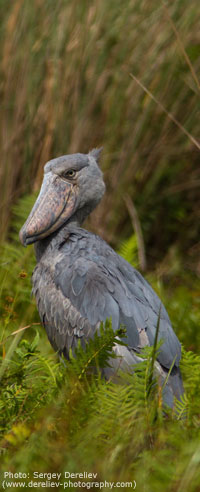Shoebill Action Planning Process Launched in a Workshop in Uganda
Entebbe/Bonn, 19 October 2012
- The Shoebill (Balaeniceps rex) is an enigmatic
species whose range is confined to a handful of countries
in tropical central-eastern Africa. Its appearance makes
it popular among zoos and private collectors, which puts
pressure on the wild population, because, with two exceptions,
the Shoebill has not been successfully bred in captivity.
The main threats related to the conservation needs of the
Shoebill are illegal trade, habitat loss and degradation
due to oil exploration and production and agricultural development,
high livestock densities and fire, especially during the
breeding season.
 In
In
order to address the conservation needs of this globally
threatened species (categorized as Vulnerable on the IUCN
Red List) the UNEP/AEWA Secretariat launched an action planning
process through a participatory workshop which took place
at the Uganda Wildlife Education Centre in Entebbe, Uganda
from 9 to 12 October 2012.
The event was hosted by the Ugandan
Ministry of Tourism, Wildlife and Antiquities
and was locally organized by NatureUganda
(the BirdLife International partner in the country). The
funding for the workshop was kindly provided by the Federal
Office for the Environment of Switzerland (FOEN).
The action planning workshop was attended
by governmental representatives and experts from seven range
states (Democratic Republic of Congo, Ethiopia, Rwanda,
South Sudan, the United Republic of Tanzania, Uganda and
Zambia) and was facilitated by Tim Dodman (independent consultant
and chief compiler of the draft action plan for the Shoebill),
Paul Kariuki Ndanganga (BirdLife
International African Partnership Secretariat)
and Sergey Dereliev (UNEP/AEWA Secretariat). Other attendees
included a representative of the Shoebill Stork Foundation
(Uganda) and the Coordinator of International Programmes
at Weltvogelpark
Walsrode who is also the Chair of the Stork
Technical Advisory Group at the European Association of
Zoos and Aquaria (EAZA).
The workshop reviewed the current knowledge
and status of the Shoebill and issues relating to its conservation.
During the workshop each country representative gave an
account of the national status of the Shoebill, state of
knowledge, threats affecting the species or its habitats
as well as ongoing or planned conservation action. A presentation
giving an overview of the presence of Shoebills in international
collections and a future outlook was given, while the UNEP/CITES
Secretariat contributed information about the international
trade in the Shoebill to the discussions at the workshop.
Presentations about the species' distribution, movements,
conservation status, research and monitoring summed up the
current knowledge about the Shoebill for participants.
On the basis of this comprehensive background
information, the workshop attendees embarked on detailed
problem analysis with regard to factors leading to negative
population trends and/or range contraction. After this extensive
exercise, the group set goals, objectives, results and activities
to construct the action framework of the international Single
Species Action Plan (SSAP). "The workshop concluded
on a very positive note and with a lot of enthusiasm for
the action plan finalization and its follow up implementation"
said Sergey Dereliev, Technical Officer of the UNEP/AEWA
Secretariat and one of the facilitators of the workshop.
The workshop participants visited nearby
Mabamba Bay Ramsar Site, where they were able to observe
a Shoebill from close proximity, which for some members
of the group was a first encounter with the species in the
wild. The local community explained the challenges faced
in implementing their community-based conservation and tourism
programme, which is an excellent example of a successful
approach to development in compatibility with species and
habitat conservation. The workshop participants appreciated
the efforts of the local community association and encouraged
its members to keep up with the great work they have been
doing; they underlined their support by providing a small
donation to the association.
Tim Dodman and Sergey Dereliev also organized
a round table discussion dedicated to the Shoebill at the
13th Session of the Pan
African Ornithological Congress (PAOC13), which
took place from 14 to 21 October 2012 in Arusha, Tanzania.
The round table discussion aimed at presenting the workshop
outcomes to interested PAOC13 participants, and to seek
input and further ideas for the compilation of the plan.
Participants at the Shoebill round tabel discussion at PAOC12
had recommended the development of a Single Species Action
Plan (SSAP) for the Shoebill. The draft plan will be compiled
within the next few months and later presented to the AEWA
governing bodies for possible adoption.
Dernière mise à jour le 16 Juin 2014


